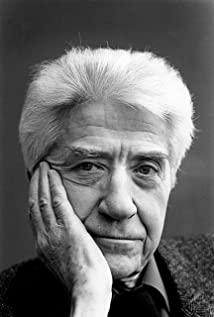"No, I saw everything."
In the ambiguous and dark intertwining, this dialogue opened the magic gate of time and space, stirring the vortex of time. Hiroshima, Japan in 1945 became the most tragic hell on earth; in Neville, France in 1945, the girl cried for a day and night beside her dead lover; in 1957, a French woman and a Japanese man had a love affair with a Japanese man. Separation of life and death. Consciousness is flowing in the fragments of this memory, setting off the joys and sorrows of walking in the fading and the deep scars of the past.
As an epoch-making work transforming from tradition to modernity in film history, "Hiroshima Love" is destined not to be thin. The 15-minute-long interweaving of documentary and narrative at the beginning of the film is astounding. The golden human body entangled in sweat, passion and joy instantly turned into the tragic state of Hiroshima after the explosion, the breath of terror and erosion accompanied by strange and depressing music slowly permeated the screen and the hearts of moviegoers. The woman's voice slowly guides the advancement of the camera, and behind the camera we can clearly feel the pulse of a flow of consciousness and memory.
The smell of rotting skin floats in the air, charred smashed stones are piled up everywhere, women in Hiroshima lose their hair overnight, girls look at their burnt faces in the mirror, blind women flick with deformed fingers Playing the chitra... The whole city was deeply branded with tragic scars by the war, and under the collective tragedy, everyone is staging their own tragic life. During the same period in France, the girl in the occupied area fell in love with the enemy, driving her bicycle at high speed on the country roads of Neville spring. The world was never a topic of war. She could only feel warm when she touched him. the truth. However, the war never knew affection and warmth. On the last day of victory, she spent a day and night with her lover's icy body, and the icy streets contained only her desperate wailing. Just as in "The Beautiful Legend of Sicily", Malena was brutally trampled on by women in the village after the war, and the girl with her long hair cut off and a flat head felt the black cat's green eyes in the saltpeter cellar. cold. The scars of an individual and the scars of a nation licked each other as if they were licking each other 14 years later. After the cold and cruelty of the war, they searched for each other's true selves.
Neither Alain Resnais nor Marguerite Duras would define the theme of this work solely on the pain of war, but in the work there is still a great deal of discussion about time and Forgetting, a proposition about memory and forgetting.
Here, one can deeply feel the test of two intertwined times for people: one is linear time, and the other is psychological time or conscious time. The former only exists for one day, a glimpse of encounter, an irresistible passion, a confession that goes straight to the heart, and an unforgettable parting. On this day, love is so splendidly open, and the sad eyes when parting can't help but hurt. But in such a time dimension, this is just a beautiful and thin love story. But another dimension of time has greatly enriched its connotation. Its range spans more than ten years, spanning two countries and two cities. It progresses with the flow of consciousness, and the memory becomes fragments one by one. Among the fragments is a sad city filled with the din of explosions, a simple and hopeless love that survives in the cracks of war, and a The cold cellar full of mockery and bullying... The intertwined body instantly transformed into a face that was shattered in the explosion, and the figure of the sleeping man in herringbone shape instantly transformed into the icy corpse of his lover, consciousness interspersed in reality, Turn into a silver thread to string memory beads together. But psychological time is incomplete. Forgetting will cut time into pieces, just like the appearance of a lover will become blurred, and the heart-wrenching grief will eventually turn into a hazy fog that covers the heart.
We can't avoid forgetting, and the sadness or joy in memory is helplessly disappearing. When you get used to forgetting, you are even more suspicious of the value of memory. She once said slowly in the tender entanglement: "Like you, I tried my best not to forget, but like you, I forgot, like you, I remembered an inconsolable memory... She also fell into deep fear because of forgetting: "It's terrible, I can't remember you very clearly, I start to forget you. Terrible! Such a deep love can be forgotten!" We also warmly I long for time, but time also eats up memory little by little. The most painful scars, the deepest love, the indelible edges and corners engraved in the heart are all weathered in time, so, what is worth remembering, what is worth cherishing. I can't forget her painful expression and downcast eyes when the man sincerely and affectionately asked her to stay for another week or three days: "What do you need time for, to live or to die?" , memory and forgetting, which one will be happier to choose? They struggle with memory and oblivion, but not even the most brutal war can stop this oblivion.
Duras always wrote about impossible and hopeless love, and always wrote about a sincere and calm woman. Whether it's "The Lover", the girl wearing a man's hat and crystal sandals on the Saigon Pier, the dress fluttering, and the elegant and cowardly oriental man, or the infatuated and melancholy French woman and the gentle and affectionate Japanese in "Hiroshima Love" man. And Lei Nai combines film and literature through pioneering methods, and through a large number of streams of consciousness, constantly wandering in the real world and the inner world, to express an impossible relationship, and the scars of the two cities after this relationship. Reflections on time and memory.
Even if it is an impossible emotion, no matter how painful the lesson, no matter how profound the love will gradually be forgotten, even if the memory is irreversibly walking in the fading, but we never face despair.
"On the fifteenth day. Hiroshima was full of flowers. Cornflowers and gladiolus bloomed everywhere. Morning glories and day lilies rose vigorously from the ashes." On the edge of it, even the faintest light shines. Just like the last moment, the woman smiled:
"Hiroshima, your name is Hiroshima."
"Yes, that's my name, that's my name. And your name is Neville, the French Neville-Ville."
As in a poem by Xi Murong: "No longer seeing each other, not forgetting, No more communication, it is not parting, just because your sorrow has been rubbed into my heart, and every time the night is cold as water, it will touch my old pain." Even if it is short, even if it will be forgotten, even if the memory will disappear, that once Love and hope will still bloom from the ashes of time at a certain moment, at a certain moment.
View more about Hiroshima Mon Amour reviews











